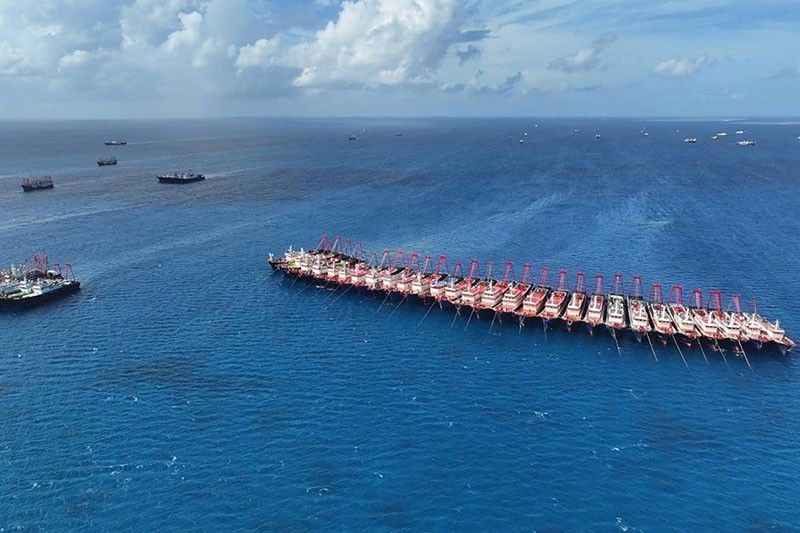Expanding scope of national security: From maritime to digital domains

As it continues to rise as a middle power in the Indo-Pacific region, the Philippines is faced with asymmetric challenges in the maritime and digital domains. These include security threats in the West Philippine Sea such as the blockage of resupply missions and dangerous maneuvers performed against Filipino vessels, as well as the rise of cybersecurity incidents and the proliferation of disinformation and misinformation. If not adequately and promptly addressed, these threats could potentially undermine regional stability and the rules-based international order.
Amidst these challenges, the Pulse Asia survey commissioned by the Stratbase ADR Institute and conducted in December last year revealed that 55% of Filipinos believe that the administration of President Ferdinand Marcos Jr. can fulfill its promise of protecting the West Philippine Sea against the illegal and aggressive actions of others.
In line with this, 67% of Filipinos believe that strengthening the external defense capability of the Philippine Navy, Air Force, and Coast Guard through the Armed Forces of the Philippines Modernization Program will serve as an effective measure to assert our rights.
Other measures deemed effective include reinforcing our alliances and partnerships with like-minded countries through the conduct of joint patrols and military exercises (56%), establishing a stronger military presence, repairing the BRP Sierra Madre and conducting regular resupply missions (52%), and improving inter-agency coordination among agencies involved in maritime security (52%).
The same survey revealed that Filipinos believe that the administration must work with like-minded partners such as the United States (79%), Australia (43%), Japan (42%), and Canada (34%) to uphold the 2016 arbitral victory and foster economic growth.
Given the complexity of issues surrounding the West Philippine Sea, the Philippines must continuously reassess and reevaluate its strategies in line with the paradigm shift proposed by the current administration. This includes taking into consideration that the rise of new and emerging technologies will influence the dynamics and behavior of key actors.
Ensuring maritime security, territorial integrity, and national sovereignty will no longer be confined in physical spaces; it has now extended to cyber space. This new development
necessitates the inclusion of cybersecurity mechanisms at the core of policies and strategies of the administration, as well as in its foreign relations with like-minded partners.
The reorganization of the National Intelligence Coordinating Agency through Executive Order No. 54 is a step in the right direction. The creation of the Office of the Deputy Director General for Cyber and Emerging Threats illustrates that securing cyber space is a requisite to achieving national security.
The office will serve as the primary conduit for the overall planning, supervision, and coordination within the agency and across the bureaucracy in safeguarding against cybersecurity threats, weapons of mass destruction, and other emerging threats.
The inclusion of cybersecurity in the country’s national security agenda will serve to strengthen our capabilities towards defending what is ours, not just in the West Philippine Sea but in the cyber realm as well. As the Philippines continues on its journey of cyber resiliency, the value of developing the capacity of its people, enhancing its processes, and strengthening relations with partners in the international community among other stakeholders cannot be stressed enough.
The Philippines, as patient zero for vulnerability, is at a crossroads. Defense Secretary Gilberto Teodoro recently stated that despite Philippines’ susceptibility to various cyber threats as it undertakes digitalization, it is also presented with opportunities.
Specifically, the Philippines is accorded with the room for working and cooperating with the industry and like-minded partners to create or adopt frameworks to effectively create a secure cyber space. This statement comes amid the defense institution’s shift of focus from internal to external security, as well as the inclusion of cyber space as the fourth domain of its operations.
A prospective partner in building the country’s cybersecurity capabilities is Canada, which is one of the most trusted countries by Filipinos. During the conference hosted by the Stratbase Institute in partnership with the Embassy of Canada in the Philippines titled “Fortifying Cyber Cooperation Towards Digital Security”, Canadian Ambassador David Hartman stated that Canada is prepared to work with the Philippines to build a resilient cyber domain. He called for a whole-of-society effort and collaborative work to combat threats arising from the emergence of new technologies and disinformation tactics.
Establishing a safe and secure digital space in accordance with the rules-based order, he said, is an essential foundation in defending sovereignty, territory, and the people. Asymmetric challenges in the maritime space and the employment of malicious tactics in the cyber domain will continue to evolve, particularly where the West Philippine Sea is concerned.
Malicious and aggressive actors will continue to reinvent their techniques in their attempts to push forward their malign intentions. As such, it is paramount that the Philippines remain vigilant both in the physical and digital spaces.
The broadening of the definition of security to include both maritime security and cybersecurity illustrates the need to increase collaboration with like-minded partners in developing effective defense mechanisms. For the Philippines, the expansion of this definition positions the country as a strategic partner in achieving the collective interest of a stable and secure region. It likewise places the country in a competitive advantage of institutionalizing an equally stable and secure environment where its national interest is safeguarded alongside the economy and its people.
Katrina Guerrero is a program and research manager at the think tank Stratbase ADR Institute.
- Latest





























